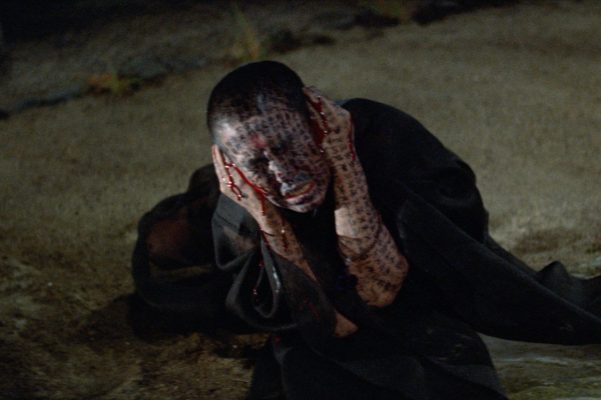Adapted from some of the traditional Japanese tales collected by Greek-born writer and traveller Lafcadio Hearn, Kwaidan is an anthology of horror that is unlikely to cause sleepless nights on the viewer’s part. It is however likely to inspire admiration for the beauty of its stylised imagery taken from Kabuki theatre, and Masaki Kobayashi’s usual masterful direction. As disparate as the stories are in tone, they’re uniform in technique. The four segments are all filmed on sound stages with painted backdrops which add to the eerie, uncanny atmosphere and add to the sense of a complete film.
The first segment ‘Black Hair’ takes a standard trope of East Asian horror, and spins a morality tale of the purest existential dread. Like his earlier masterpiece Harakiri, it takes a sardonic look at the Bushidō codes of the samurai as an ex-warrior (Rentarô Mikuni) leaves his life of poverty and adoring wife to take up a more lucrative position with a wealthy family and their coldly acquisitive daughter. When he returns home in a haze of remorse, he realises just how awful his mistake was. ‘Black Hair’ is the most purely horrific of the four stories. In a society dominated by the concept of honour as Edo-period Japan was, the ghosts of those dishonoured can turn out to be the most ferocious of all. Kobayashi can also freight a simple action with different meanings. The brushing of long, black hair is indicative of both purity and simplicity in the case of the warrior’s first wife, and chilly vanity in the wealthy. Along with ‘The Woman of the Snow’, it’s the strongest segment of the film.
‘The Woman of the Snow’ takes the legend of the Yuki-onna as its basis for a story of Shakespearean tragedy. Woodcutter Minokuchi (Tatsuya Nakadai) is spared death in a blizzard by the titular spirit, on the condition he never speak of what he saw. In time he marries the beautiful and curiously ageless Yuki (Keiko Kishi) and the couple have three children. One night he’s inspired to tell his wife the tale of the Woman of the Snow… This beautiful section has the sheer weight of inevitability, with the beautiful painted backdrops literally showing Minokuchi being watched by ghostly, floating eyes. Unlike the faithless samurai of ‘Black Hair’, he’s largely blameless, making ‘The Woman of the Snow’ a gorgeous and melancholy meditation on the nature of fate.
‘Hoichi the Earless’ is the longest and most visually ornate of the three tales. The first part is an elaborate staging of the finale of the ‘Tale of the Heike‘, with a narrative voiceover in the Rōkyoku style. The narrator turns out to be Hoichi (Katsuo Nakamura), a blind biwa player who is lured away nightly by the spirits of the vanquished Heike clan to perform the tale of their anguish. Realising that continued performances will be fatal to Hoichi, the priests of his temple decide to take action. The opening battle is stunning in its staged theatrically, and the rest of the story never quite lives up to that opening. It does feature some particularly striking imagery, even by the high standards of the rest of the film. The scene where Hoichi is painted head-to-toe in protective sutras is perhaps Kwaidan‘s most iconic.
Kwaidan concludes with ‘In a Cup of Tea’, the shortest and weakest section of the film. The story cuts between a publisher in 1900 coming across an old tale that finishes without and ending. In the older thread a man sees a strange face in a cup of tea. Drinking the tea despite the odd phenomenon, he’s visited by three samurai. This odd story feels insubstantial compared to the others, dealing thematically with the nature of storytelling itself, and the power contained within. For all its general throwaway nature, it does have a blackly humorous sting in the tail.
Perhaps labelling Kwaidan as simply a horror film does it a disservice in the sense that it raises expectations Kobayashi never intended to meet. The stories are fairy tales and fables, like those collected by Aesop and the Brothers Grimm. The themes are as universal as they are in any tales dealing with oral tradition. The story of the Yuki-onna has been modernised into the likes of Ringu, and the modern urban legend of the slit-mouthed woman, The Kuchisake-onna. There are versions of the Hoichi tale all over the world, such as musicians being whisked away to perform for the Trows of Shetland, and utilised in modern literature such as the character of Stephen Black lured to crepuscular revelries by the Gentleman with the Thistle-Down Hair in Susanna Clarke‘s Jonathan Strange & Mr. Norrell. So while they aren’t scary as such, certainly not by modern standards, they represent a wonderful clash of the old and new as the traditional fables meet the modern magic of cinema. The artistry of Kobayashi and his fidelity to theatrical traditions make Kwaidan endlessly rewarding viewing, and a trifle of its seemingly daunting three-hour run-time.
Available on Blu-ray from Mon 27 Apr 2020
